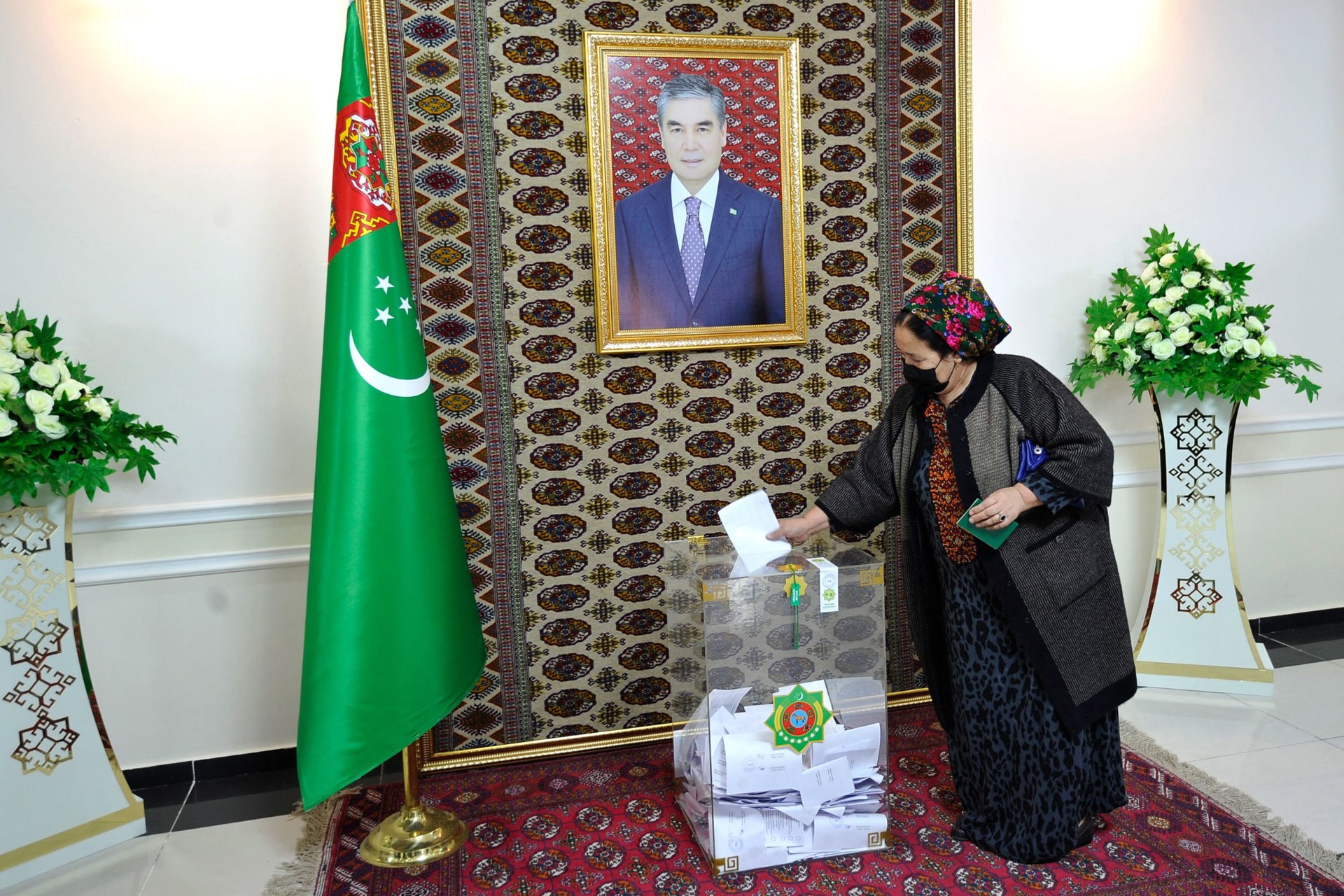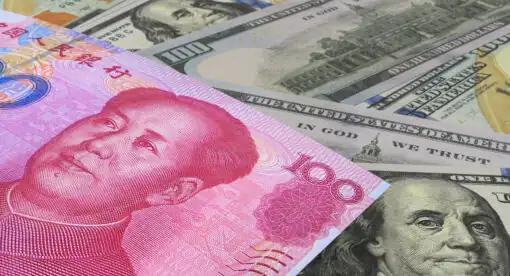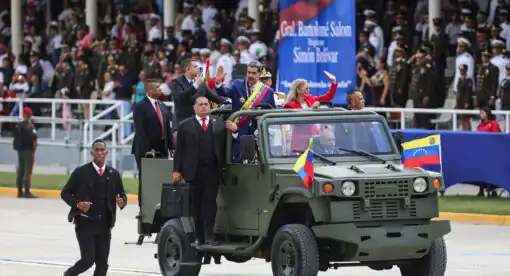Turkmenistan is one of the most isolated countries in the world, both geographically and politically. It is also a huge source of natural gas, a commodity in high demand. An impending political transition could alter Turkmenistan’s China-dominated foreign policy, one defined almost exclusively by energy exports and international seclusion.
On March 12, Turkmenistan held elections without longtime President Gurbanguly Berdymukhamedov on the ticket but with his son Serdar emerging victorious. The elder Berdymukhamedov nominated Serdar, the Swiss-educated deputy prime minister and vice chair of the ruling Democratic Party of Turkmenistan, as a presidential candidate in February. This announcement coincided with rumors that the president was stepping down due to health reasons. It is too soon to tell whether the younger Berdymukhamedov will impose policies similar to his father’s. While there are no guarantees, this shift could mark an inflection point for Turkmenistan’s external politics, especially in the context of Russian ostracization from the international financial community and growing Western demand for natural gas.
Despite boasting 19.5 trillion cubic meters of dry natural gas reserves – the sixth largest in the world – Ashgabat has not been able to play a major role in global energy markets because of limited infrastructure. Instead, the country has adopted a non-diversified economic policy that relies largely on natural gas export revenues to China, estimated at 35 billion cubic meters annually. A political transition could bring changes to this well-established policy; however, human capital constraints and the regime’s preoccupation with its own security and survival may militate against liberalization. Even with explicit interest from Ashgabat for a more balanced foreign policy, China is likely to push back against any Western pivot that could disrupt the status quo. This will be the real test for Serdar Berdymukhamedov’s regime.
Energy Concerns: Dependence on the East, Potential in the West
The elder Berdymukhamedov once attempted to establish an East- and West-facing energy policy, but issues with Gazprom and an explosion in 2009 that destroyed part of the pipeline between Turkmenistan and Russia saw the Turkmen relationship with Russia dwindle. The country pivoted to China for investments and a market for its natural gas exports. Turkmenistan is still currently is exporting about 5 billion cubic meters of deeply discounted natural gas a year to Russia, mostly for resale. Now, with the war in Ukraine raging and sanctions against Gazprom in place, the chances of Ashgabat to sell gas via Russia may diminish.
Turkmenistan’s natural gas reserves represent an estimated 10% of global supplies. China is currently the largest buyer of Turkmen natural gas, with imports in 2021 reaching an estimated maximum of 35 billion cubic meters. Turkmenistan is China’s third largest natural gas supplier, accounting for 40% of China’s natural gas imports.
In January 2022, President Xi Jinping of China pledged $500 million in aid to Central Asian countries including Turkmenistan. This aid is designed to ensure the continued operation of gas and oil pipelines and promote energy sector development to fuel China’s growth and served to foster the Turkmenistan-China agreement that allows China’s state-owned CNPC to increase its drilling in the country and export its resources to China.
Although Turkmenistan turned to China after the 2009 pipeline explosion, Russia has been increasing its influence since 2019. In May of that year, Turkmenistan signed a five-year contract with Gazprom for yearly supplies of 5.5 billion cubic meters. This strengthens the Russia-Turkmenistan relationship. Furthermore, Russia expects to nearly double its imports of natural gas from Turkmenistan from 5 billion to around 10 billion cubic meters this year. This is not a new tactic for Moscow; Russia historically utilizes its legacy north-south facing pipeline infrastructure to import cheap gas from energy-rich former Soviet states to then resell it to Europe at a higher price point.
It remains unclear what effect the Russian invasion of Ukraine will have on Moscow’s relations with Ashgabat and whether Turkmenistan would be willing or able one day to send gas to energy-hungry Europe – even without Russia’s help. As Europe is anxious to diversify its sources of gas, Turkmenistan has a great opportunity to expand its gas sector into new territory and ease its economic sector away from Russia and China.
The Russia-Ukraine conflict has resulted in an acute global energy scarcity. Russia is responsible for 15% of world energy exports, including 40% of Europe’s gas imports – the lion’s share of which transits through Ukraine. Crippling sanctions from the United States and Europe (including the recent U.S. embargo of Russian oil and gas) are propelling energy prices to levels not seen since 2008. The cantankerous relationship between Russia and the West could provide Turkmenistan with the opportunity to work with European countries; however, most of Turkmenistan’s gas is spoken for by Russia and China, and more exploration and production may be needed. This would be a good opportunity for U.S., European, Middle Eastern, or Japanese and South Korean companies to step in.
An additional problem is that the Turkmens do not have the infrastructure or transportation technology to move gas independently. With the lack of an undersea Trans-Caspian pipeline, they are left with few options. The first would be to move gas through Russia into Europe – an option that quickly becomes less viable as the conflict with Ukraine continues. The second option would be to move gas through Iran and Turkey. These routes face steep political obstacles as Moscow might derail the Iran JCPOA deal. Until there is a reliable pipeline – either a restored pipeline to Russia or the construction of a new project connecting to the Trans-Anatolian and Trans-Adriatic pipeline system that moves Azerbaijani gas to Europe – Turkmenistan will remain dependent on Russia for its westward exports.
Turkmenistan continues to sell its gas on the border and has refused to commit financially to the Trans-Caspian undersea pipeline, leaving this endeavor to its neighbors. In a recent interview with Forbes, former U.S. Ambassador to Turkmenistan Allan Mustard notes, “Turkmenistan has a commodity, natural gas, suddenly in much higher demand in Europe due to geopolitics. The question is whether Turkmenistan is prepared to collaborate with Western businesses and governments to deliver it.”
Mustard additionally noted, “Turkmen natural gas has for the past few years been viewed in the West as unlikely ever to go anywhere but Russia, China, and Iran. The Turkmenistan-Afghanistan-Pakistan-India, or TAPI, pipeline has failed to secure funding. This crisis could change the picture, but only if Turkmenistan shows willingness to work with countries to the west of the Caspian on delivering natural gas to new customers.”
For years, Turkmenistan was interested in sending gas to Pakistan and India via Afghanistan. The TAPI gas pipeline has been stalled for many years. However, after the U.S. withdrawal from Afghanistan and the subsequent Taliban takeover, interest in the project reemerged. The Taliban have recently reiterated commitment to TAPI. The pipeline could help ease relations between Afghanistan and its neighbors. This 1,800-kilometer, partially constructed pipeline would transport 33 billion cubic meters of natural gas annually from Galkynysh in Turkmenistan to Fazilka in India. The major obstacles are India’s reluctance so far to commit to a long-term contract to buy the gas and the lack of financing for pipeline construction. For Turkmenistan, the present concern is who will buy the remaining Turkmen gas. Russia could be interested in the TAPI pipeline. However, much of this will be put on hold while the world decides what to do next about Russia’s aggression in Ukraine.
New Opportunities: Gas to Liquids
Turkmenistan is a leader in GTL technology, since it is home to the world’s only operational natural gas-to-gasoline plant. The plant produces synthetic gasoline that meets the highest environmental requirements, contains no sulphur and produces very few harmful byproducts. This represents Turkmenistan’s ambitions plans to turn its vast natural gas reserves into a clean energy initiative that can support their move to diversify and expand their economy.
At least in theory, the election of a new president who is more open to the West could benefit the country’s global standing and its economic development. A prime example is Kazakhstan, which maintains a multi-vector foreign policy that has allowed it to maintain relationships with Russia, China, and the United States, much to the benefit of its investment climate. Kazakhstan has not been without its troubles recently, going through political turmoil in January 2022 that turned tragically violent – yet the Kazakhs remain committed to economic reforms, government transparency, and meeting the needs of their citizens. If this proves successful, the Turkmens could model any reforms they make after Kazakhstan.
A positive ripple effect that will intensify political and economic reforms and that will open the country to new energy investments would be tremendously beneficial for the country. However, if the current highly authoritarian regime continues unabated under Serdar, extreme poverty, food shortages, and corruption will persist regardless of how much the West could benefit from Turkmen gas supplies.
Ariel Cohen, PhD, is Non-Resident Senior Fellow at The Atlantic Council and Director, Energy, Growth and Security Program at International Tax and Investment Center (iticnet.org). He is the author of six books and monographs, including Russian Imperialism: Development and Crisis, and over 1,000 articles. He regularly contributes to leading TV channels, including CNN, CNBC, BBC, Fox, and Bloomberg, and contributes to The Wall Street Journal, The Hill, Forbes, Newsweek, and other publications
Riley Moeder is a program assistant at ITIC.
The views expressed in this article are those of the author and not an official policy or position of the New Lines Institute.







